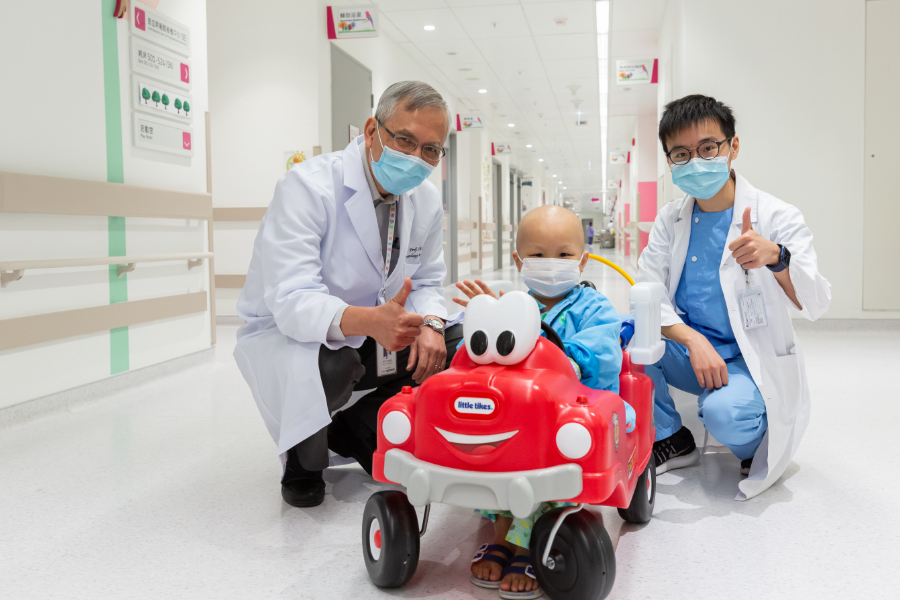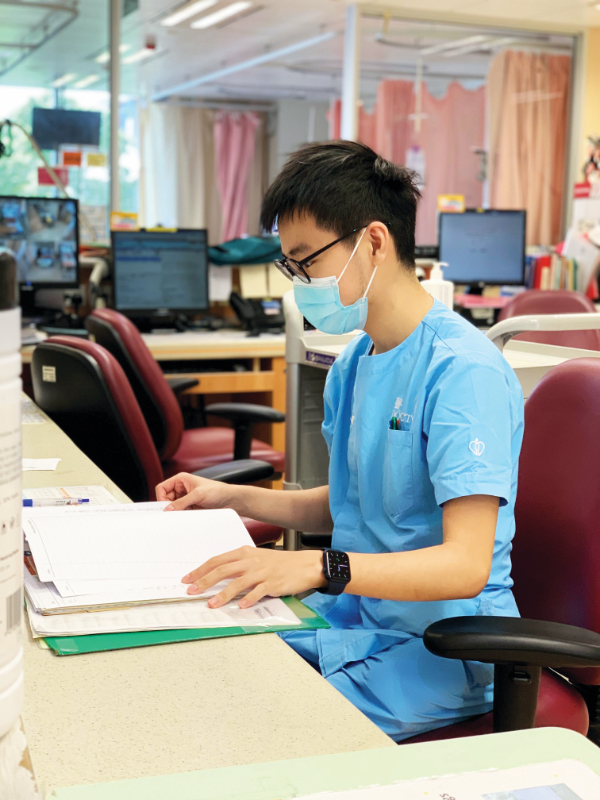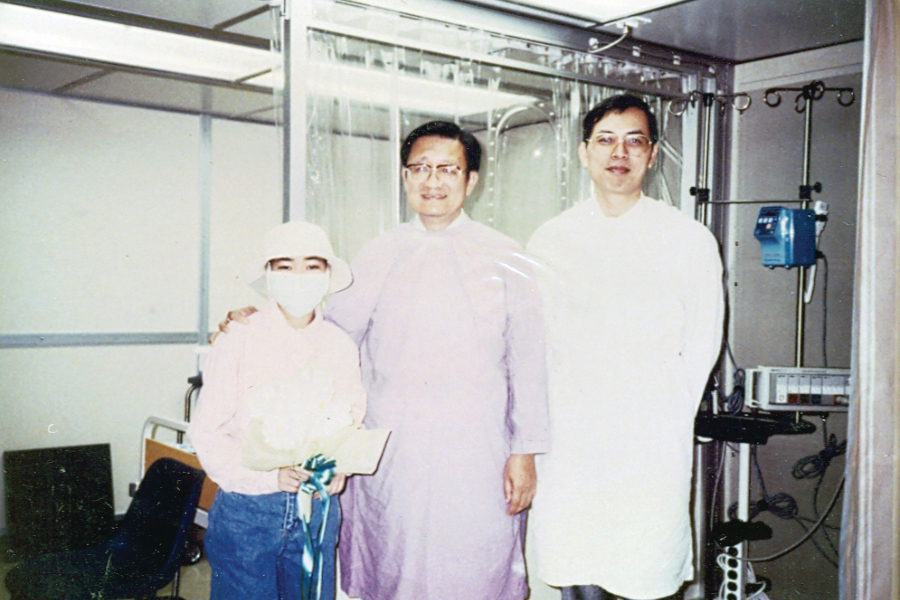The greatest gift to a doctor

For doctors, there is nothing more heartening than seeing a patient recover. Dr Brian Poon, a leukaemia survivor, is now an intern doctor at the Prince of Wales Hospital (PWH). When he was diagnosed ten years ago, he was treated by Dr Li Chi-kong, the Chief of Service of the hospital’s Department of Paediatrics at the time. Smiling behind his mask, Dr Li is delighted to have his former patient become a colleague and describes it as a gift.
Chemotherapy is tough and painful, but Dr Li recalls that Brian was calm and cooperative while undergoing treatment. “ Brian overcame a lot during the journey. For instance, he had to endure anticoagulants injection under the skin for three consecutive months due to vessel blockage,” Dr Li says.
Beneath his calm exterior, Brian was anguished and anxious. “I couldn’t accept at first and kept asking ‘why me?’” He says. “I had a lot of worries too. Could I complete my exam before starting the treatment? Should I have my dental braces removed when mouth ulcers appear as a side effect? I was fortunate to have doctors who were willing to listen to me and address my concerns.” Having that first-hand experience, Brian has developed patience and a sense of empathy for patients. Now, he makes time to listen to his patients, despite the busy schedule. “A doctor sees many patients in a day, but a patient only has one doctor to rely upon,” he reflects. “I believe doctors should be responsible, and put themselves in patients’ shoes.”

Dr Li agrees, “Doctors usually make decisions from their perspectives and believe they already offer patients the best option. However, patients may not think the same. We as doctors need to bear in mind that we are here to help, not to do any harm.”
Dr Li is currently a professor in the Department of Paediatrics of The Chinese University of Hong Kong, and an Honorary Consultant in the Haematology and Oncology unit of Hong Kong Children’s Hospital (HKCH). He reckons that the development in paediatrics over the past 30 years has been extraordinary. Subspecialisation allows doctors to focus more on treating difficult and uncommon diseases, and contributes to the development of new treatments and research. Besides, new diagnostic tools such as genetic tests are now available to identify the culprit behind diseases. In the case of complex conditions, a multidisciplinary approach would be adopted to formulate the best treatment plan for patients.
“When I was a houseman 40 years ago, I was assigned to do a liver biopsy. My senior just told me to read the instruction manual and do it myself! Can you imagine?” Dr Li jokes. Nowadays, the Hospital Authority has strict guidelines on high-risk medical procedures. Practitioners must undergo appropriate training and assessment in advance to ensure patient safety.
A good doctor treats the whole person, not just the disease. Brian says healthcare workers today care more about the feelings of patients and families. They are more willing to communicate and proactively provide support. Dr Li echoes, “In the old days, we just cured the patients and then discharged them, but now we emphasise quality of life and holistic care. For example, we look for ways to relieve patients’ discomfort, collaborate with allied health professionals and NGOs to address their psychological needs, and conduct home assessment to suggest practical modifications."
Despite medical advancements, the goal of helping patients remains unchanged. Dr Li recalls a leukaemia patient who had a relapse after bone marrow transplant. “We expected to lose him any time. After discussing with the parents, we stopped all aggressive treatments,” he says. Surprisingly, the little fighter got better bit by bit and eventually recovered. “I don’t believe in miracles, but this case reminds me that every patient responds differently to treatment. As doctors, we should try our very best to save lives.” Dr Li is looking forward to the emergence of more new treatments, such as gene therapy in Hong Kong, which may benefit patients with congenital diseases like thalassemia and leukaemia.
Seeing patients recover and live a fruitful life is the greatest gift a doctor can ask for.
Dr Li is currently a professor in the Department of Paediatrics of The Chinese University of Hong Kong, and an Honorary Consultant in the Haematology and Oncology unit of Hong Kong Children’s Hospital (HKCH). He reckons that the development in paediatrics over the past 30 years has been extraordinary. Subspecialisation allows doctors to focus more on treating difficult and uncommon diseases, and contributes to the development of new treatments and research. Besides, new diagnostic tools such as genetic tests are now available to identify the culprit behind diseases. In the case of complex conditions, a multidisciplinary approach would be adopted to formulate the best treatment plan for patients.
“When I was a houseman 40 years ago, I was assigned to do a liver biopsy. My senior just told me to read the instruction manual and do it myself! Can you imagine?” Dr Li jokes. Nowadays, the Hospital Authority has strict guidelines on high-risk medical procedures. Practitioners must undergo appropriate training and assessment in advance to ensure patient safety.
A good doctor treats the whole person, not just the disease. Brian says healthcare workers today care more about the feelings of patients and families. They are more willing to communicate and proactively provide support. Dr Li echoes, “In the old days, we just cured the patients and then discharged them, but now we emphasise quality of life and holistic care. For example, we look for ways to relieve patients’ discomfort, collaborate with allied health professionals and NGOs to address their psychological needs, and conduct home assessment to suggest practical modifications."
Despite medical advancements, the goal of helping patients remains unchanged. Dr Li recalls a leukaemia patient who had a relapse after bone marrow transplant. “We expected to lose him any time. After discussing with the parents, we stopped all aggressive treatments,” he says. Surprisingly, the little fighter got better bit by bit and eventually recovered. “I don’t believe in miracles, but this case reminds me that every patient responds differently to treatment. As doctors, we should try our very best to save lives.” Dr Li is looking forward to the emergence of more new treatments, such as gene therapy in Hong Kong, which may benefit patients with congenital diseases like thalassemia and leukaemia.
Seeing patients recover and live a fruitful life is the greatest gift a doctor can ask for.
